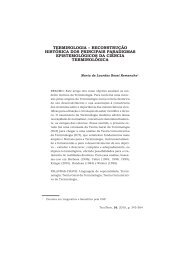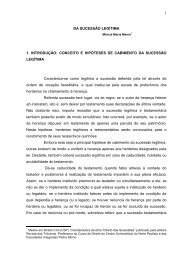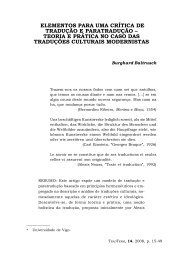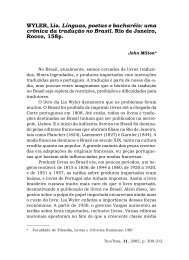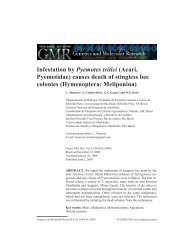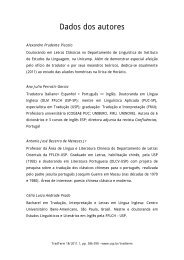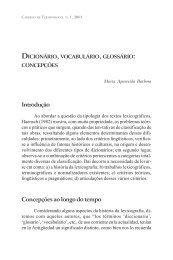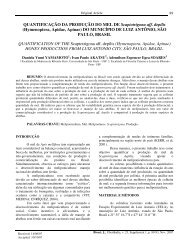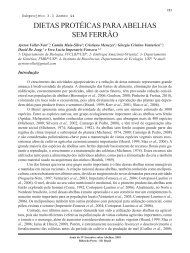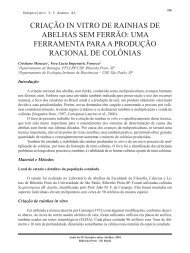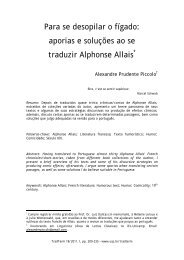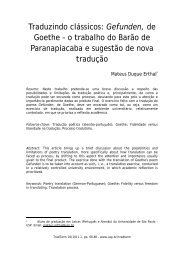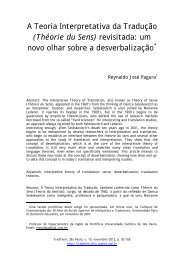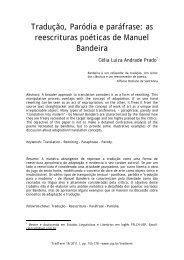Bees as pollinators in Brazil - USP
Bees as pollinators in Brazil - USP
Bees as pollinators in Brazil - USP
You also want an ePaper? Increase the reach of your titles
YUMPU automatically turns print PDFs into web optimized ePapers that Google loves.
Proposed methods:<br />
• List flagship plant species and expla<strong>in</strong> their need for <strong>poll<strong>in</strong>ators</strong>.<br />
• Stress the beneficial role of non-charismatic animals, such <strong>as</strong> bats.<br />
• Invent popular, appeal<strong>in</strong>g names for <strong>poll<strong>in</strong>ators</strong>.<br />
• Promote courses on the use of urban green are<strong>as</strong>.<br />
• Produce and distribute user-friendly, <strong>in</strong>formative material.<br />
Workshop I 47<br />
2. Lead<strong>in</strong>g laboratories should be encouraged to participate <strong>in</strong> the mapp<strong>in</strong>g of genetic diversity and<br />
structure of native plant populations of economic importance.<br />
Currently many laboratories throughout <strong>Brazil</strong> are well equipped for the t<strong>as</strong>k, but few of them are<br />
<strong>in</strong>volved <strong>in</strong> study<strong>in</strong>g these organisms.<br />
Proposed methods:<br />
• Cooperative tra<strong>in</strong><strong>in</strong>g courses.<br />
• Government fund<strong>in</strong>g through public calls.<br />
• Propose charismatic national or local species to obta<strong>in</strong> private or public funds.<br />
3. Government agencies should produce, support and make widely available user-friendly<br />
material (pr<strong>in</strong>ted, electronic, tra<strong>in</strong><strong>in</strong>g courses), so that the above recommendations are put to<br />
practice by f<strong>in</strong>al users.<br />
There are currently many comprehensive studies of economically important plants and <strong>poll<strong>in</strong>ators</strong><br />
whose results are unknown to the f<strong>in</strong>al user because of restricted (academic, technical) circulation. It<br />
is important that the <strong>in</strong>itiative of produc<strong>in</strong>g this material be officially sponsored and supervised by scientists<br />
so <strong>as</strong> to ga<strong>in</strong> credibility.<br />
Proposed methods:<br />
• Books could be transformed <strong>in</strong>to PDF with the authors’ consent and be made available at official<br />
sites l<strong>in</strong>ked to agriculture, such <strong>as</strong> FAO, EMBRAPA, and WebBee (<strong>Brazil</strong>).<br />
• Production and distribution of user-friendly, <strong>in</strong>formative material, such <strong>as</strong> leaflets and booklets.<br />
• Tra<strong>in</strong><strong>in</strong>g courses.<br />
F<strong>in</strong>al remarks<br />
Methods<br />
Explanations of some recommended techniques<br />
follow, with emph<strong>as</strong>is on <strong>Brazil</strong>ian<br />
study c<strong>as</strong>e examples. Among the methods<br />
proposed to help perform the recommendations,<br />
several rapid <strong>as</strong>sessment protocols<br />
(RAP) could be developed, grouped broadly<br />
<strong>in</strong>to two: botanical (phenology, flower density,<br />
poll<strong>in</strong>ation syndromes, plant breed<strong>in</strong>g sys-<br />
tems) and poll<strong>in</strong>ator (bee behaviour <strong>in</strong> the<br />
flower and among plants, flight range) RAPs.<br />
There is a v<strong>as</strong>t literature on the parameters to<br />
be considered with<strong>in</strong> each of these two, and<br />
on how to me<strong>as</strong>ure them. These protocols will<br />
allow data collection <strong>in</strong> the field by people<br />
with little or no formal biological tra<strong>in</strong><strong>in</strong>g.<br />
Other methods, <strong>in</strong>clud<strong>in</strong>g statistical analyses,<br />
require both expertise and specific facilities,<br />
and will usually be performed by researchers<br />
and tra<strong>in</strong>ed personnel.



